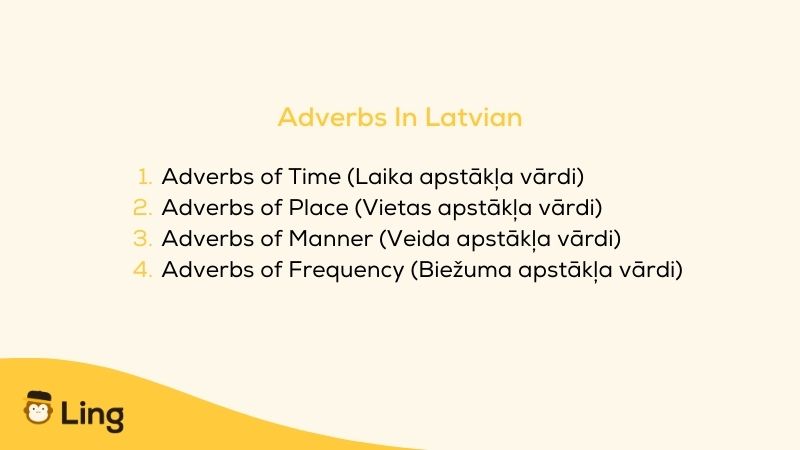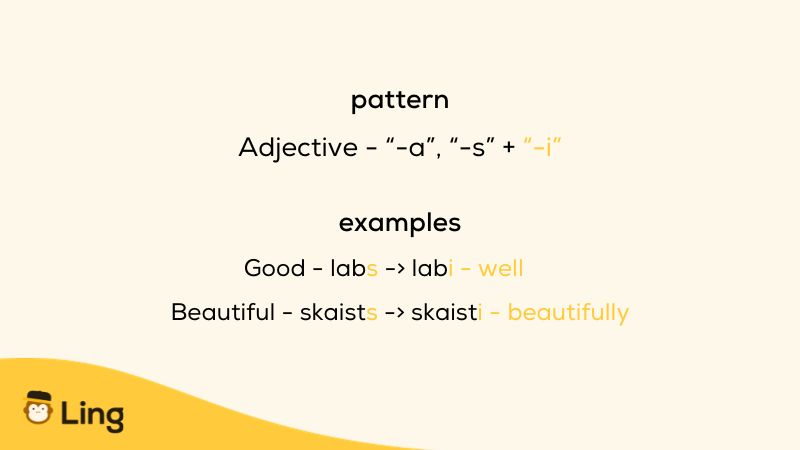Latvian is a Baltic language that has a unique set of adverbs, or “apstākļa vārdi”. They help you describe how, when, and where an action is performed, which are essential details for effective communication in any language.
In this article, you will learn commonly used Latvian adverbs and how they are formed in Latvian grammar. If you’re ready, let’s start learning!
What Are Adverbs?
Before we start learning Latvian adverbs, let’s clarify what adverbs do in a sentence!
Adverbs are words that describe verbs, adjectives, and other adverbs. They answer questions such as “how,” “when,” “where,” and “to what extent” in a sentence. They can significantly enhance the meaning and clarity of a phrase.
In Latvian vocabulary, there are different types of adverbs that describe words in different aspects, such as time, place, frequency, and manner.

Types Of Latvian Adverbs
Latvian adverbs are categorized into four main types, each serving a unique purpose.
- Adverbs of Time (Laika apstākļa vārdi)
- Adverbs of Place (Vietas apstākļa vārdi)
- Adverbs of Manner (Veida apstākļa vārdi)
- Adverbs of Frequency (Biežuma apstākļa vārdi)
Let’s take a look at them one by one.
Adverbs Of Time – Laika Apstākļa Vārdi
Adverbs of time answer the question “when.” They give information about the time an action takes place, whether it’s in the past, present, or future.
Adverbs Of Place – Vietas Apstākļa Vārdi
On the other hand, adverbs of place answer the question “where.” As their name suggests, they can give information about the place where an action or event occurred.
| English | Latvian | Pronunciation |
|---|---|---|
| here | šeit | |
| there | tur | |
| over there | tur | |
| everywhere | visur | |
| anywhere | jebkur | |
| nowhere | nekur | |
| home | mājās | |
| away | prom | |
| out | ārā |
Adverbs Of Manner – Veida Apstākļa Vārdi
These adverbs answer the question “how,” giving details about the way an action is performed.
| English | Latvian | Pronunciation |
|---|---|---|
| very | ļoti | |
| quite | pavisam | |
| fast | ātri | |
| well | labi | |
| hard | grūti | |
| quickly | ātri | |
| carefully | uzmanīgi | |
| hardly | tikko | |
| barely | tikko | |
| mostly | galvenokārt | |
| almost | gandrīz | |
| absolutely | absolūti | |
| together | kopā | |
| alone | tikai |
Adverbs Of Frequency – Biežuma Apstākļa Vārdi
Finally, adverbs of frequency answer the question “how often.” They describe how frequently an action is performed.
| English | Latvian | Pronunciation |
|---|---|---|
| always | vienmēr | |
| frequently | bieži | |
| usually | parasti | |
| sometimes | dažreiz | |
| occasionally | laiku pa laikam | |
| seldom | reti | |
| rarely | reti | |
| never | nekad |
The List Of Most Commonly Used Latvian Adverbs
That’s a lot of adverbs, right? But not all of them are used every day. So, here is a list of the most commonly used Latvian adverbs for you!
| English | Latvian | Pronunciation |
|---|---|---|
| now | tagad | |
| yesterday | vakar | |
| tomorrow | rīt | |
| at night | naktī | |
| here | Šeit | |
| there | tur | |
| up | augšup | |
| down | lejup | |
| quickly | Ātri | |
| slowly | lēni | |
| carefully | rūpīgi |
How To Use Latvian Adverbs In Sentences
Using Latvian adverbs in Latvian sentences is pretty simple. You have to add the adverb after the word they describe. For example:
- He runs quickly. – Viņš skrien ātri.
- He spoke very quietly. – Viņš runāja ļoti klusi.
- I work carefully. – Es strādāju rūpīgi.

How To Form Adverbs In Latvian
I want you to think about how you form English adverbs for a minute. You simply add “-ly” at the end of an adjective, right?
It’s as easy as that in Latvian, too!
To form an adverb in Latvian, you must change the feminine or masculine form endings “-s” and “-a” to “-i.” For example:
- Good – labs
- Well – labi
However, in Latvian, some words and phrases are adverbs by nature, which means they don’t need an “-i” suffix. For example:
- Now – šobrīd
- Really – patiešām
- Soon – drīz
Special Cases: ‘To Speak’ And ‘To Understand’
Latvian adverbs have a special use when describing the verbs ‘to speak’ or ‘to understand’ referring to a language. It might seem weird, but you have to change the languages – even though they are normally nouns – to adverbs by adding the “-i” suffix at the end.
So to get the idea behind this, think like this:
In Latvia, they don’t say, “I speak English.” They say, “I speak Englishly.”
More examples:
- Es runāju latviski. – I speak Latvian. (literally, “I speak Latvianly“)
- Es runāju angliski. – I speak English. (literally, “I speak Englishly“)
- Es runāju krieviski. – I speak Russian. (literally, “I speak Russianly“)
Tips For Learning Latvian Adverbs
To become proficient in using Latvian adverbs, practice is the key. Here are some exercises you can do:
- Start with basic adverbs and gradually incorporate more complex ones into your vocabulary.
- Listen to native speakers and pay attention to how they use adverbs in conversations.
- Keep a journal of commonly used adverbs and their meanings.
- Create sentences using adverbs of time, place, and manner.
- Describe daily activities using different adverbs.
- Translate English sentences into Latvian, incorporating adverbs.
Latvian adverbs are a fascinating aspect of the language that adds more details and clarity to your sentences. By understanding and using them effectively, you can enhance your proficiency in Latvian.
And if you’re looking for an online resource to learn Latvian at home, you must check out the Ling app!
Start Learning Latvian With Ling!
Want to learn Latvian but can’t find a comprehensive language-learning app that teaches it? Then you haven’t tried the Ling app yet!
The Ling app is designed to help anyone who is passionate about learning a new language. Ling teaches you Latvian from scratch with game-like activities, such as multiple-choice writing and listening exercises, grammar tips, quizzes, vocabulary matching, and an AI chatbot to practice your Latvian speaking skills.
So, what are you waiting for? Download the Ling app from the App Store or Play Store and start learning Latvian today!
Hey! Did you know that Ling has a massive blog covering all things related to language learning? Visit Ling’s Latvian blog weekly for articles about the Latvian language and its culture!



































































